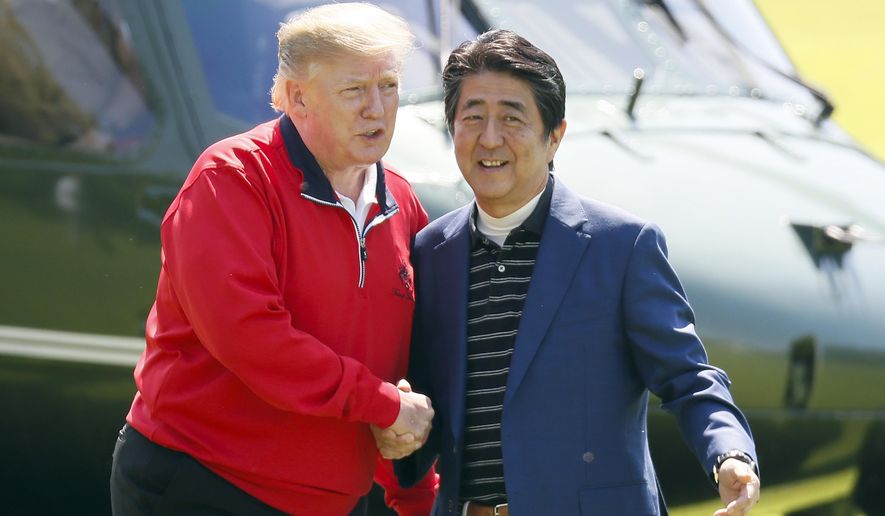Japanese Prime Minister Shinzo Abe’s efforts to charm President Trump in Tokyo appeared to pay dividends Sunday, as the president touted “great progress” in striking a trade deal after a round of golf and a sumo wrestling showcase in which Mr. Trump presented an American-themed trophy before a mesmerized crowd.
Mr. Trump may have unnerved his hosts, however, with a tweet that undercut Japanese officials and his own advisers on North Korea’s latest missile tests.
“North Korea fired off some small weapons, which disturbed some of my people, and others, but not me,” Mr. Trump tweeted, appearing to contradict National Security Adviser John R. Bolton, who on Saturday said the tests violated U.N. Security Council resolutions.
The tests are no small thing for Mr. Trump’s Japanese hosts.
“Unlike the U.S., Japan remains under threat from North Korea’s medium-range ballistic missiles,” said John Lee, a senior fellow at the Hudson Institute. “Tokyo would therefore like to see a continuation of economic sanctions against Pyongyang rather than a let-up of pressure.”
Mr. Trump and Mr. Abe will have a chance to work it out Monday, when they hold extended bilateral talks and meet with the families of Japanese people who’ve been abducted by North Korea.
SEE ALSO: Donald Trump, Shinzo Abe enjoy golf, sumo tournament
Before the formal meetings Monday, Mr. Trump and Mr. Abe held a short joint news conference, where the U.S. leader said the two men would discuss military cooperation, trade and North Korea.
Mr. Trump had just come from receiving the honor of being the first foreign leader to meet Japan’s new emperor.
The grand red-carpet welcome ceremony at the Imperial Palace, where Mr. Trump reviewed Japanese troops as the guest of honor, opened with handshakes and greetings from Emperor Naruhito, who ascended to the throne on May 1, and his wife, Empress Masako.
As he approached the emperor, Mr. Trump said, “How are you? Thank you very much.” First lady Melania Trump told Masako, “Nice to meet you.”
The meetings and a state banquet at the Imperial Palace later Monday will cap a whirlwind state visit that appeared tailor-made to flatter Mr. Trump’s ego.
Mr. Abe is using high ceremony and flattery to cozy up to Mr. Trump, though serious matters lie beneath the pomp and circumstance.
SEE ALSO: Donald Trump meets new Japan Emperor Naruhito
The White House wants Japan to pay a bigger share of the costs for U.S. troops stationed there, and it will decide by November whether to slap debilitating levies on Japanese cars.
Mr. Trump said things were looking up, so they’d make tough decisions after Mr. Abe weathers elections in midsummer.
“We will be announcing some things, probably in August … that will be good for both countries,” Mr. Trump said at Monday’s news conference, adding that “some very positive things are happening on trade.”
Mr. Trump’s push to reset trade imbalances with foreign nations, while giving American workers a fairer shake, is a signature issue for him heading into the 2020 campaign.
“Japan has had a substantial advantage for many, many years, but that’s OK. Maybe that’s why you like us so much,” Mr. Trump told Japanese business leaders Saturday at the home of William F. Hagerty, the U.S. ambassador to Japan.
Moving forward, he said, trade will be “a little bit more fair, I think.”
Mr. Abe, meanwhile, is hoping to keep the bilateral relationship on an “even keel” during the ceremonious visit, according to Scott Seaman, director of Asia for the Eurasia Group.
“Abe has done his best to pack Trump’s itinerary in Japan with events designed to keep him entertained and in good spirits, and most important, dampen his desire to spend the trip accusing Japan of being an unfair and ungrateful trade and security partner and demanding redress,” he wrote in an analysis of the trip.
Mr. Abe posted a selfie of the leaders smiling on the golf course in Chiba on Sunday, while their wives — first lady Melania Trump and Akie Abe — visited the teamLab Borderless museum in Tokyo, an innovative collection of digital exhibits.
Later, the first couple took in a sumo wrestling tournament at Ryogoku Kokugikan Stadium. They were seated in chairs — not on traditional mats — a few yards from the sumo ring, and Mr. Abe appeared to lean over and describe the action at times.
Reporters traveling with the president said he did not clap or react much when the wrestlers faced him, threw ceremonial salt or swayed from side to side.
Capping the tournament, Mr. Trump emerged with the “President’s Cup,” eliciting oohs and ahhhs from the crowd. He read a “certificate of commemoration” for Asanoyama, the winner, and presented the trophy.
“In honor of your outstanding achievement as sumo grand champion I hereby award you the President’s Cup,” Mr. Trump said.
Mr. Trump and the first lady then had a postgame meal at Inakaya, a hibachi restaurant.
Though he is thousands of miles away, Mr. Trump refused to ignore his political feuds in Washington and even dragged the Japanese into the spat.
“Numerous Japanese officials told me that the Democrats would rather see the United States fail than see me or the Republican Party succeed — Death Wish!” he tweeted.
He also appeared to align himself with North Korean dictator Kim Jong-un, in taking a swipe at his most prominent 2020 Democratic rival, former Vice President Joseph R. Biden.
“I have confidence that Chairman Kim will keep his promise to me, & also smiled when he called Swampman Joe Biden a low IQ individual, & worse. Perhaps that’s sending me a signal?” he tweeted.
The tweet was corrected from an earlier version that misspelled the Democratic front-runner’s last name as “Bidan.”
• Tom Howell Jr. can be reached at thowell@washingtontimes.com.




Please read our comment policy before commenting.